Look AI Breakthrough: Indian-origin Scientist Discovers Battery
New Delhi, January: Vijay Murugesan, an Indian-origin scientist, and his team discovered a new battery material using artificial intelligence (AI) and supercomputing, which could reduce the use of lithium batteries.
Microsoft and the Pacific Northwest National Laboratory (PNNL) in the United States collaborated on the findings.
The new battery material was developed using Microsoft’s Azure Quantum Elements, which narrowed down 32 million potential inorganic materials to 18 promising candidates for battery development in only 80 hours.
The Microsoft Quantum team used artificial intelligence to identify approximately 500,000 stable materials in just a few days.
According to the scientists, the new material could potentially reduce lithium consumption by up to 70%. Since its discovery, the new material has been used to power a lightbulb. The AI-derived material is a solid-state electrolyte.
Ions move back and forth through the electrolyte, between the cathode and anode, ideally with little resistance.
Initially, scientists believed that sodium ions and lithium ions couldn’t coexist in a solid-state electrolyte system because they were similarly charged but different sizes.
It was assumed that the structural framework of a solid-state electrolyte material could not accommodate the movement of two distinct ions.
But after testing, Murugesan stated, “We discovered that the sodium and lithium ions appear to help each other.”
Lithium gained popularity as a battery component in the early 1900s, but rechargeable lithium-ion batteries did not enter the market until the 1990s. Today, lithium-ion batteries power everything from cell phones to medical devices, electric vehicles, and satellites.
The US Department of Energy predicted that lithium demand would grow five to tenfold by 2030. Lithium is already relatively short and therefore costly.
Mining it poses environmental and geopolitical risks. Traditional lithium-ion batteries also pose safety concerns, as they have the potential to catch fire or explode.
Many researchers are looking for alternatives to lithium and the materials used in electrolytes. The scientists believe that solid-state electrolytes show promise in terms of stability and safety.





certainly like your website but you need to take a look at the spelling on quite a few of your posts Many of them are rife with spelling problems and I find it very troublesome to inform the reality nevertheless I will definitely come back again